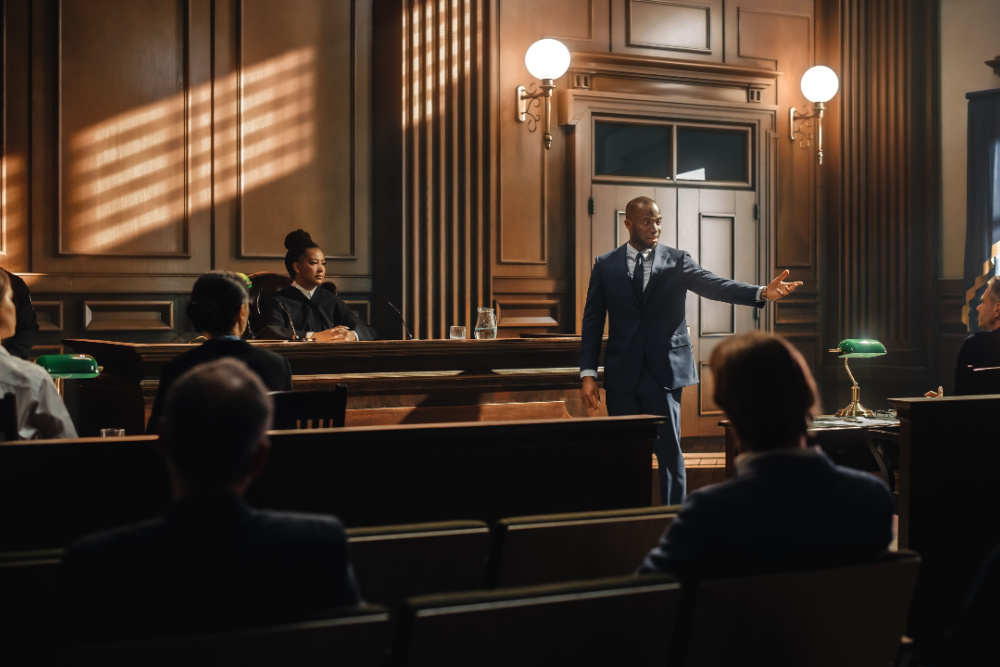
In the complex setting of a courtroom, effective communication is not just an asset—it’s a necessity. While evidence and legal precedent shape the foundations of a case, the way this information is conveyed can significantly impact its outcome. To the uninitiated, speaking persuasively in a legal context might seem straightforward. Still, the science of trial communication is nuanced, requiring a well-thought-out strategy and an understanding of human psychology.
Effective courtroom communication goes beyond words; it encompasses body language, tone, and even timing. The judge and jury are not mere spectators but engaged participants whose perceptions and judgments are continuously shaped by what they see and hear. This blog post explores the art and science of communicating effectively with these two pivotal groups.
Understanding Your Audience: Judge vs. Jury
Before crafting any communication strategy, it’s essential to understand that judges and juries are distinct audiences. A judge is a trained legal professional accustomed to parsing through legal jargon and making decisions rooted in law. On the other hand, juries are typically laypersons with no formal legal training, guided more by their interpretation of the facts and emotional responses.
Therefore, your language and approach must be tailored differently for each group. While a judge may appreciate detailed legal arguments substantiated with case law, a jury may find this overwhelming or even alienating. Understanding these differences is the first step in developing an effective communication strategy that can sway both groups in your favor.
The Importance of Clarity and Simplicity
When presenting your case, one fundamental principle to abide by is clarity. Whether it’s the judge or the jury, the courtroom is no place for convoluted language or complex, hard-to-follow arguments. Lack of clarity can lead to misunderstandings, which can have severe consequences in a legal setting.
Simplicity should be different from watering down your arguments. Instead, it means presenting your case in an accessible manner. This is especially crucial when communicating with a jury, who may need to gain the legal background to understand industry jargon or complex procedural details. Every point must be articulated clearly and simply, ensuring your arguments are accessible and compelling.
Emotional Intelligence: Reading the Room
Emotional intelligence is crucial in any form of communication, and the courtroom is no exception. Understanding how the judge and jury react in real time can guide you on when to emphasize a point, when to step back, and when to change tack entirely. This skill is not just about reading facial expressions; it’s also about sensing the emotional temperature of the room and adapting your strategy accordingly.
For instance, if you notice that the jury seems confused or disinterested, it might indicate that you need to clarify your points or make your narrative more relatable. On the other hand, if the judge is showing signs of impatience, it may be wise to get to your point more quickly. Emotional intelligence can act as your real-time feedback mechanism, enabling you to adjust your approach and optimize your impact.
Nonverbal Communication: Beyond Words
It’s not just what you say but also how you say it. Nonverbal cues can significantly influence how your message is received. Simple gestures, eye contact, and even the tone and pitch of your voice can either reinforce your message or contradict it.
Maintaining good posture, for instance, exudes confidence and can make you more persuasive. Eye contact can foster a sense of connection, making it more likely for your audience to trust you. Even your attire can send a message; a well-dressed attorney may command more respect than one who appears disheveled. Understanding the nuances of nonverbal communication can give you an additional layer of influence in the courtroom beyond your words.
Renzi Legal Resources: Your Partner in Effective Courtroom Communication
At Renzi Legal Resources, we recognize that effective courtroom communication is a fine art, perfected with practice and a deep understanding of trial science. Our team of seasoned professionals can provide invaluable insights and strategies to make your courtroom presence genuinely impactful.
Armed with cutting-edge technology and rooted in scientific research, we aim to elevate your communication skills to the next level. Whether you’re an attorney seeking to make a compelling case or a corporate client looking to understand the nuances of effective courtroom communication, we offer a range of services tailored to meet your specific needs.
Conclusion: Communication as a Pillar of Legal Success
In the legal arena, where stakes are high and margins for error are low, effective communication can be the linchpin of success. This is not merely about rhetorical prowess but involves a nuanced blend of clarity, emotional intelligence, and nonverbal cues. Each of these elements comes together to create a compelling narrative that can resonate with both judge and jury, serving the ultimate goal of justice.
Are you looking for court reporting services in New Jersey? If so, contact us today!
